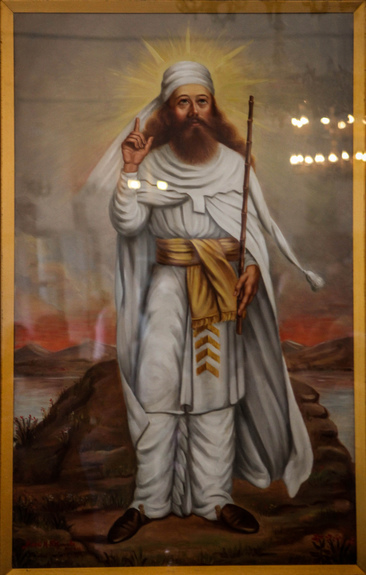Between Stockholm Syndrome and Lima Syndrome
Part 19: No Religion is 100% Pure and Built from Scratch
 Zoroaster
Zoroaster An idea isn't responsible for the people who believe in it.
-Don Marquis
In the history of religious figures, nobody is probably more influential, yet less known, than Zoroaster. We all know Buddha, Jesus, Muhammad, but Zoroaster? Also known as Zarathustra (as in Friedrich Nietzsche's novel Thus Spoke Zarathustra), he was the founder of the world's oldest monotheistic religion of Zoroastrianism and the author of the Yasna Haptanghaiti and the Gathas liturgical hymns. Known as a native speaker of Old Avestan who lived in the eastern part of the Iranian Plateau, historians and scholars still argue about his lifetime. Most scholars agree that he lived in the late-6th century BCE (between 625 and 550 BCE), though others believe that he lived in north-east Iran sometime earlier, between 1400 and 1200 BCE. One thing is certain however: Zoroaster is widely regarded as the sage who introduced earth-shattering ideas during his lifetime: the concepts of heaven and hell, the last judgment, the resurrection of the dead, and the final apocalyptic war between good (Light) and evil (Darkness). Most of Zoroaster's teachings were eventually adopted by Abrahamic religions (Judaism, Christianity and Islam). His signature ideas can still be recognized today in the forms of binary opposites of rewards and punishments, heaven and hell, good and evil.
As they say, the rest is history.
Initially Zoroastrian influenced Judaism, then Christianity, and later Islam. Indeed Christianity may have received Zoroastrian beliefs third hand. About 1,000 years after Zoroaster's life, the extremely influential Christian theologian and philosopher Augustine of Hippo (354-430) proposed similar tenets. Augustine may have been indirectly inspired by Zoroaster, since before converting to Christianity, he was actually a Manichean which was influenced by Zoroastrian. The point I'm trying to make is that no religion is 100% pure and built from scratch—whatever this means—because each known organized religion has always adopted tenets from other religion(s) that existed before. Buddhism derived from Hinduism, Christianity from Judaism, Islam from both Judaism and Christianity.
And yet, as we have witnessed in exasperation, human civilization has been littered with inter-religious wars, persecutions, cruelty, violence, zealotry, crusades, inquisitions, stonings, witch-burnings, jihads, fatwas, decapitations, suicide bombings, abortion-clinic murders, religious persecutions even genocide. All of those acts have been committed—ironically—for the sake of salvation in life after death. To repeat Jesuit priest Anthony de Mello as stated in Part 12, What is God's Religion?: "Religion as practiced today deals in punishments and rewards. In other words, it breeds fear and greed—the two things most destructive of spirituality." As had been stated, but still worth repeating, religion derives from the word religare (Latin) which means 'to bind.' Hence the dreadful situation in which we are kept as hostages by our own beliefs. Most of us are still bound and hung up by the binary opposites of hell and heaven—thanks to Zoroaster.
Therefore what we believe can always be taken with a pinch of humility, if not with a healthy dose of skepticism. No religion should take itself too seriously. More than 2,300 years had passed since the Greek philosopher Plato (428-348 BCE), in his famous Allegory of the Cave, warned us about mistaking shadows on the walls for real objects. Many things that we think we "believe" are actually based on a misperception of objective reality. Too often we believe in fallacies and—as if that is not bad enough—disbelieve facts. In the name of "belief", we endorse falsifications and resist verifications.
Often with tragic results.
In Awareness: The Perils and Opportunities of Reality (1990), Jesuit priest Anthony de Mello relayed a story about a group of people who were stranded on a raft off the coast of Brazil, perishing from thirst. They strongly believed that the water they were floating on was undrinkable salt water, instead of fresh water. The reality? Actually the river was coming out into the sea with such force that it went out for a couple of miles, so they had fresh water right there where they were. Kept as hostages by their own beliefs, they perished from thirst. If only one among them was open-minded enough and would cup his or her hand to taste the water, the entire group might have been saved. If only they would examine their belief…
Hence the critical need to understand ourselves. We have always been susceptible to make decisions based on false perceptions. Not taking ourselves too seriously is a serious business. Constant re-examination of our beliefs is a sine qua non to understand ourselves. As Socrates once said, the unexamined life is not worth living for a human being.
[To be continued.]
Johannes Tan, Indonesian Translator & Conference Interpreter
-Don Marquis
In the history of religious figures, nobody is probably more influential, yet less known, than Zoroaster. We all know Buddha, Jesus, Muhammad, but Zoroaster? Also known as Zarathustra (as in Friedrich Nietzsche's novel Thus Spoke Zarathustra), he was the founder of the world's oldest monotheistic religion of Zoroastrianism and the author of the Yasna Haptanghaiti and the Gathas liturgical hymns. Known as a native speaker of Old Avestan who lived in the eastern part of the Iranian Plateau, historians and scholars still argue about his lifetime. Most scholars agree that he lived in the late-6th century BCE (between 625 and 550 BCE), though others believe that he lived in north-east Iran sometime earlier, between 1400 and 1200 BCE. One thing is certain however: Zoroaster is widely regarded as the sage who introduced earth-shattering ideas during his lifetime: the concepts of heaven and hell, the last judgment, the resurrection of the dead, and the final apocalyptic war between good (Light) and evil (Darkness). Most of Zoroaster's teachings were eventually adopted by Abrahamic religions (Judaism, Christianity and Islam). His signature ideas can still be recognized today in the forms of binary opposites of rewards and punishments, heaven and hell, good and evil.
As they say, the rest is history.
Initially Zoroastrian influenced Judaism, then Christianity, and later Islam. Indeed Christianity may have received Zoroastrian beliefs third hand. About 1,000 years after Zoroaster's life, the extremely influential Christian theologian and philosopher Augustine of Hippo (354-430) proposed similar tenets. Augustine may have been indirectly inspired by Zoroaster, since before converting to Christianity, he was actually a Manichean which was influenced by Zoroastrian. The point I'm trying to make is that no religion is 100% pure and built from scratch—whatever this means—because each known organized religion has always adopted tenets from other religion(s) that existed before. Buddhism derived from Hinduism, Christianity from Judaism, Islam from both Judaism and Christianity.
And yet, as we have witnessed in exasperation, human civilization has been littered with inter-religious wars, persecutions, cruelty, violence, zealotry, crusades, inquisitions, stonings, witch-burnings, jihads, fatwas, decapitations, suicide bombings, abortion-clinic murders, religious persecutions even genocide. All of those acts have been committed—ironically—for the sake of salvation in life after death. To repeat Jesuit priest Anthony de Mello as stated in Part 12, What is God's Religion?: "Religion as practiced today deals in punishments and rewards. In other words, it breeds fear and greed—the two things most destructive of spirituality." As had been stated, but still worth repeating, religion derives from the word religare (Latin) which means 'to bind.' Hence the dreadful situation in which we are kept as hostages by our own beliefs. Most of us are still bound and hung up by the binary opposites of hell and heaven—thanks to Zoroaster.
Therefore what we believe can always be taken with a pinch of humility, if not with a healthy dose of skepticism. No religion should take itself too seriously. More than 2,300 years had passed since the Greek philosopher Plato (428-348 BCE), in his famous Allegory of the Cave, warned us about mistaking shadows on the walls for real objects. Many things that we think we "believe" are actually based on a misperception of objective reality. Too often we believe in fallacies and—as if that is not bad enough—disbelieve facts. In the name of "belief", we endorse falsifications and resist verifications.
Often with tragic results.
In Awareness: The Perils and Opportunities of Reality (1990), Jesuit priest Anthony de Mello relayed a story about a group of people who were stranded on a raft off the coast of Brazil, perishing from thirst. They strongly believed that the water they were floating on was undrinkable salt water, instead of fresh water. The reality? Actually the river was coming out into the sea with such force that it went out for a couple of miles, so they had fresh water right there where they were. Kept as hostages by their own beliefs, they perished from thirst. If only one among them was open-minded enough and would cup his or her hand to taste the water, the entire group might have been saved. If only they would examine their belief…
Hence the critical need to understand ourselves. We have always been susceptible to make decisions based on false perceptions. Not taking ourselves too seriously is a serious business. Constant re-examination of our beliefs is a sine qua non to understand ourselves. As Socrates once said, the unexamined life is not worth living for a human being.
[To be continued.]
Johannes Tan, Indonesian Translator & Conference Interpreter

 RSS Feed
RSS Feed